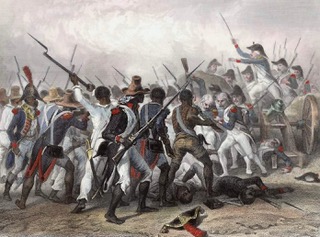The New York Times has published a “revelation” about the involvement of French and US imperialism in Haiti, the poorest country in the western hemisphere.
Imperialism in form can change from time to time, but in essence it is the extraction of surplus value. During the colonial period the force used by imperialism to extract surplus value was blatant, but after decolonisation it was by means of trade agreements and loans that have strings attached.
Structural changes in the economy in favour of capital are necessary for the country to avail of these loans from financial institutions such as the International Monetary Fund and the World Bank.
Frantz Fanon, in his book The Wretched of the Earth (1961), wrote that “when we hear the head of a European state declare with his hand on his heart that he must come to the help of the poor underdeveloped peoples, we do not tremble with gratitude; we say to ourselves: ‘It’s a just reparation which will be paid to us.’”
The imperialist countries owe a lot to the colonised countries for the imperial looting, damage and degradation they imposed during the colonisation. But it’s an irony that the opposite happened in Haiti.
After the French Revolution in 1789 the people of Haiti revolted against their colonisers—France—in 1791. C. L. R. James wrote in his book The Black Jacobins (1938) that Haiti’s was the only successful slave revolution in human history, which created the first Black republic in 1791. The ruling classes saw this as a bad example and could not tolerate the temerity of the enslaved indigenous black people who revolted against an imperial state. Even George Washington was scared of the impact the Haitian revolution would have on the black slaves in the United States, on whose slavery the American economy depended.
Therefore England, France and the United States did not recognise the new republic, and Haiti had to pay a big price to be recognised and for the embargo and international isolation to be lifted. In 1825 France demanded “reparation debt” from the colonised country as compensation for the loss brought about by the revolution—which included that of the the slaves freed by the revolution.
Haiti, which was sucked dry by the imperial parasite, had to depend on loans from French banks. One of the banks, Crédit Industriel et Commercial, which had a direct influence on the Haitian economy, was the one that financed the Eiffel Tower. In fact 80 per cent of Haiti’s expenditure was on servicing the reparation debt.
Jean-Bertrand Aristide, the first democratically elected president, demanded that France pay reparations for its imperial exploitation and compensation for the damage done during the colonial period. As usual, in 1991 a coup d’état removed Aristide and expelled him to the Central African Republic and later to South Africa. This was a warning given by imperialism to countries that dare to ask for compensation for the colonial plunder of their resources.
The New York Times has published what we already know, but the message will reach more people about the basis of the “greatness” of the imperial states and how the surplus sucked out of colonised nations created the wealth they proudly possess.
As Walter Benjamin told us, “there is no document of civilisation that is not at the same time a document of barbarism.”






